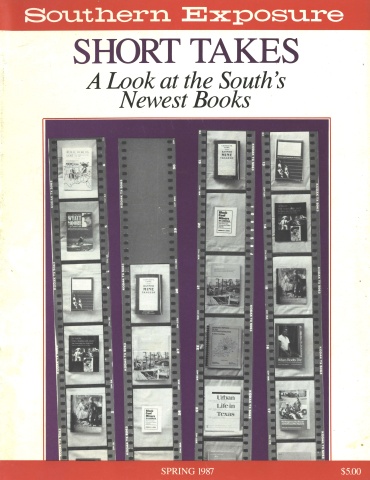Voices from the Past: “The brightest and best was killed in Nat’s time.”

This article originally appeared in Southern Exposure Vol. 15 No. 1, "Short Takes." Find more from that issue here.
We all know about Nat Turner — or do we? He led a slave insurrection in Southampton County, Virginia, on August 22, 1831. Some 60 whites died, and a greater number of blacks were killed in the repression. “In Nat’s time,” a black woman named Charity Bowery recalled, “the patrols would tie up the free colored people, flog ’em, and try to make ’em lie against one another, and often killed them before anyone could interfere. The brightest and best was killed in Nat’s time.”
What did black Southerners have to hide during the months of widespread reprisals? White opinion was split from the start. Some sensed a well-planned “abolitionist plot” across much of the South. Others downplayed the incident as a spontaneous outburst prompted by a single “fanatical” leader. Virginia Governor John Floyd became “fully convinced that every black preacher in the whole country east of the Blue Ridge was in the secret.”
“In relation to the extent of this insurrection,” Floyd wrote in November, “I think it greater than will ever appear.” Unfortunately, most of the documents forwarded by Floyd to the Virginia House of Delegates have never been found. Only a few tantalizing items still survive in his “Slave and Negro Letterbook, 1831” at the Virginia State Library in Richmond. Eventually, they may help a new generation of historians rewrite this crucial but shadowy chapter of Southern history.
One undated scrap of paper, pictured here, set the day for rebellion as the last Sunday in October and carried the postscript: “do burne this as soon as yo read it. ” The author signed himself Joe Dr. — conceivably the same “Dr. Joe” who had been active in Virginia at the time of Prosser’s Revolt three decades earlier, or a follower who had taken up his name and his cause. This docu ment, Floyd noted at the bottom, had been “Furnished by a gentleman near Richmond city after the insurrection. It was found in the road below the City five or six miles.”
Another hastily written item in the same letterbook is from an anti-slavery white in Chesterfield County, between Richmond and Petersburg. The author, whose last name remains unclear, was writing to a free black in Richmond named Ben Lee, a week after Turner’s Southampton uprising. When combined with other evidence, his note suggests — as many have speculated — that Nat’s action may well have been a premature outbreak in a loose-knit plan that was to encompass a far larger area. The spelling and punctuation in the text below have been modified for clarity.
— Contributed by Peter H. Wood, Hillsborough, N.C.
Chesterfield Aug 29 1831
My old fellow Ben —
You will tell or acquaint every servant in Richmond & adjoining counties they all must be in a strict readiness; that this occurrence will go through Virginia with the slaves & whites. If there had never been an association & a visiting with the free & slaves, this would never had of been. They are put up by the free about their liberation. I’ve wrote to Norfolk [to the southeast], Amelia, Nottaway [to the west] & several other counties to different slaves. Bob Hill, Miller Bowles, John Furguson, Fed Toney(?) & several other free fellows has put up Dr. Crump’s, Mr. Field’s, Mr. Scott’s & a great many gentlemen’s private servants how they must act in getting of their liberation. They must set fire to the city, beginning at Shockoe Hill, then going through, east-west-north-south, set fire to the bridges. They are about to break out in Goochland [to the northwest] & in Mecklenburg County [to the southwest] & several other counties very shortly. Now there is a barber here in this place [known] as Jery(?) [who] tells me [that] a Methodist of the name Edwards has put a great many servants up how they should do & act by setting fire to this town. I do wish they may succeed. By so doing, we poor whites can get work as well as the slaves or colored. . . . Ruben, Mr. Archer’s servant, say that Billy Hickman has just put him up how to revenge the whites. All the bright mulattoes of Richmond wants to be white. So boys, you all must do the best you all can for yourselves. . . . They has stopped your all’s religion, Edwards says. So you all ought to get revenge some way. Every white in this place is scared to death, except myself & a few others. This Methodist has put up a great many slaves in this place how to do, I can tell you. So push on boys, push on.
Your friend, Williamson Mann (?)